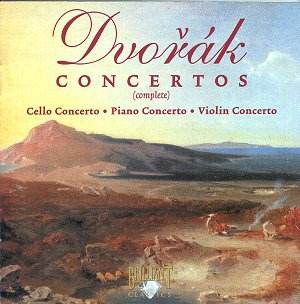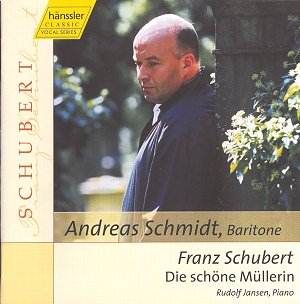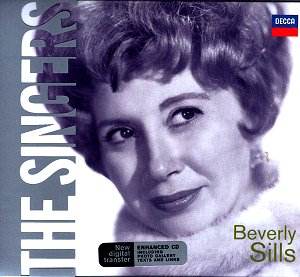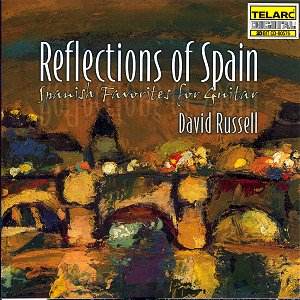 Composer: Antonin Dvořák
Composer: Antonin Dvořák
Works: Piano Concerto, Violin Concerto, Cello Concerto, Romance for Violin and Orchestra, Mazurek for Violin and Orchestra, Silent Woods, Rondo for Cello and Orchestra
Performers: Rudolf Firkusny, piano; Ruggiero Ricci, violin; Zara Nelsova, cello; Saint Louis Symphony Orchestra / Walter Susskind
Recording: Licensed from Vox, early to mid-seventies
Label: BRILLIANT CLASSICS 99763 [2 CDs 129.50]
Antonin Dvořák’s oeuvre is rich with the vibrancy of Czech folk themes interwoven with the broader symphonic traditions of the late 19th century. This comprehensive set brings together several of his concerted works, showcasing not only the composer’s melodic inventiveness but also the nuanced interplay that defines his orchestral writing. The performances, led by the underappreciated maestro Walter Susskind, reveal the depths of Dvořák’s music while presenting a compelling case for both the soloists and the orchestra.
Susskind’s interpretation of the Cello Concerto, featuring Zara Nelsova, highlights the work’s emotional landscape without resorting to excessive sentimentality. Nelsova’s playing is characterized by a remarkable blend of technical precision and lyrical sensitivity. The opening tutti, executed with clarity by the Saint Louis Symphony, sets the scene for her entry, which is both disciplined and expressive. In the first movement, Nelsova’s articulation of the passagework is cohesive, allowing the music’s tension to unfold organically. Unlike the more flamboyant interpretations of Rostropovich or the expansive approach of Du Pré, Nelsova’s performance is marked by a sense of architectural integrity, where each phrase contributes to a larger narrative rather than merely showcasing virtuosity. The haunting dialogue between the cello and flute in the desolate passage is a striking example of how Susskind has meticulously prepared the orchestral fabric to enhance the soloist’s poignant entry.
The Piano Concerto, with Rudolf Firkusny at the keys, presents a different set of challenges and rewards. Firkusny’s interpretation navigates the work’s intricate passages with an ease that belies its complexity, his tempo choices revealing a clear connection to the Brahmsian influences that permeate the score. The orchestra, under Susskind’s direction, offers a responsive and vibrant backdrop, particularly notable in the interplay during the first movement’s energetic central section. Firkusny’s cadenza is a highlight; his ability to maintain architectural clarity while executing rapid passages showcases not only his technical prowess but also his deep musical understanding. The slow movement is particularly exquisite, where Firkusny’s limpid treble lines evoke a sense of longing and beauty, maintaining momentum without sacrificing lyrical expression.
Ruggiero Ricci’s contribution in the Violin Concerto is more contentious. While his performance is undeniably intense, it occasionally teeters on the edge of over-expressive. Susskind’s orchestral support remains meticulously crafted, yet Ricci’s approach can seem brusque, especially when juxtaposed with the more measured interpretations of artists like Itzhak Perlman or Josef Suk. The folk-inflected finale, however, finds Ricci in his element, as he navigates the lively passages with vigor, demonstrating the work’s buoyant spirit. Yet, one might argue that his interpretation lacks the depth of phrase-shaping exhibited by his predecessors.
The inclusion of shorter works such as the Romance for Violin and Orchestra and the Mazurek for Violin and Orchestra serves to further illuminate the distinct qualities of each soloist. Nelsova’s deftness contrasts sharply with Ricci’s more fervent style, offering listeners a well-rounded perspective on Dvořák’s idiomatic writing for strings. The engineering of this budget release, while not without its quirks, allows the orchestral textures to emerge clearly, conveying the richness of the ensemble’s sound.
This collection, while historically rooted in the recordings of the early seventies, presents a fresh and invigorating perspective on Dvořák’s concertos. Susskind’s adept conducting, alongside the formidable talents of Nelsova and Firkusny, reveals the intricacies of Dvořák’s orchestration and the emotional depth of his solo lines. The performances encourage a deeper appreciation of these works, enhancing their understanding and accessibility. For listeners seeking a comprehensive exploration of Dvořák’s concerted output, this set not only offers performances of merit but also invites a re-evaluation of the music’s enduring appeal.



